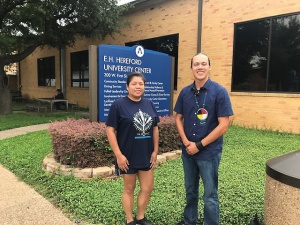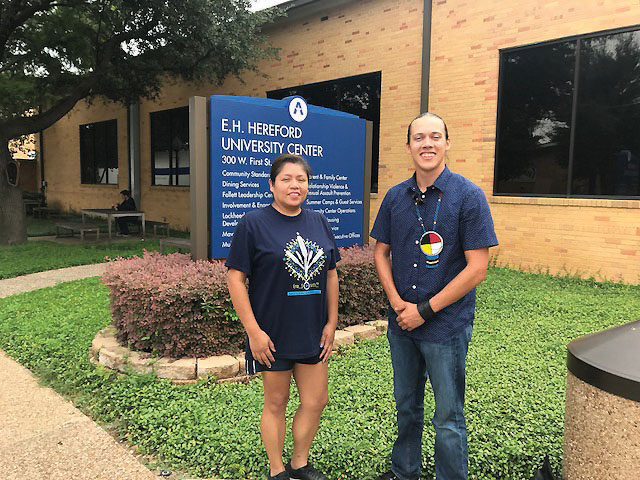
For three years in a row, Winds of Change magazine has listed The University of Texas at Arlington as one of the “Top 200 Colleges for Native Americans.” The magazine, which is a publication of the American Indian Science and Engineering Society, ranked the school as a top destination for indigenous students interested in studying science, technology, engineering and math.
Kasey Reynolds, a 27-year-old Cherokee who grew up in Fort Worth, is one of those students. Reynolds arrived at UTA with a background in engineering from the Navy but he plans to focus on environmental science.
Although the growth rate for environmental science jobs is higher than average, according to the U.S. Department of Labor, Reynolds said that is not all that attracted him to the field. “I care about taking care of the land I’ve been entrusted with,” he says. “What I’m going to be doing is something that’s going to help this land. And that appeals to me.
“I wanted to switch from studying how humans can do stuff to how nature already does stuff and how we can adapt ourselves to it,” he continues. “I can’t do something just for money.”
Reynolds also is excited about the possibility of getting to work with companies to develop building and landscape designs that are more sustainable for their communities.
“UTA science has just been exploding,” he notes, explaining how the university’s expanding science program drew him to the college and how the school’s Native American community has helped him connect with advisors and other students with whom he can interact and relate.
Reynolds is a member of UTA’s Native American Student Association (NASA), a group that organizes cultural events, educates about social issues, and provides scholarships and other opportunities for its members.
Dr. Kenneth Roemer, the group’s faculty adviser, says NASA members have a strong desire to connect with their heritage, and nearly all of them graduate from UTA.
NASA president Kristy Willis says the group is small, but its members seek out and understand one another. Willis, an Oklahoma Choctaw and senior communications major, says everyone, including non-college students, is welcome. And members do not have to be enrolled with a tribe or even be Native American to join NASA. “We want people to be involved with us,” says the 43-year-old part-time student and mother of two, who transferred to UTA from Tarrant County College after finding out about the group. Members are not only connected with each other but the community, as well, Willis says, adding that many people are unaware that North Texas has such a large Native American community with diverse tribal affiliations.
“[People] think we all live on reservations or we still live in teepees,” she says. “We kind of want to break that stereotype.”
It is unfortunate, Reynolds says, that history teaches a narrative that Native Americans are frozen in time and facts such as how the Cherokee had evolved into farmers or how American Indian tribes today are living, progressive societies are not being discussed.
Roemer, who taught his first Native American literature course at UTA in 1972, says it is unfortunate that most public schools do not teach the vast collection of Native American history that is preserved through tradition, singing and oral storytelling. Because of that, he says, indigenous people are often pigeonholed into a stereotype fueled by Hollywood movies.
Willis is looking forward to taking some of the Native American history courses that are available at UTA. She also talks about how NASA’s most important event is its annual Powwow, which is open to the public. UTA’s 23rd annual Powwow will take place March 3, 2018, when Native Americans – and many other people – will come from Texas, Oklahoma, Louisiana and other places for the event. One dancer last year even came from New York.
Willis says the Powwow is always held in a respectful manner. Tobacco is given to the drum, a longtime Native American powwow tradition. And input is gathered from members, elders and advisers. Willis says that by weaving tradition into NASA events, the group teaches the community, as well as themselves.
“[UTA President] Dr. [Vistasp] Karbhari, he’s always been real supportive,” she says. “He always comes to our Powwow, and he speaks to our crowd.”
Reynolds has been dancing in powwows for years. “I always dance for the ancestors and tell a story,” he says.
Reynolds explains how that when he follows his traditions, and the advice of his elders, things naturally go better for him in life. If not, he might get sick, go broke, or an eagle feather will fall from his dance regalia – every time.
“You can call it karma,” he says. “I call it living a good life. It takes a lot of prayer and searching to figure out what’s going wrong. And your elders can always point you to how you can do right and do right in your community.”
But Reynolds says many people today “don’t listen at all.” And Willis says many people just want to argue.
Willis notes that some Native Americans feel they are “walking in two worlds,” trying to balance cultural tradition with modern society, which can be especially challenging in the Metroplex. She says she and others treasure visiting their families where they can eat traditional foods and hear their tribal language spoken.
“Where I’m from, we don’t even have a stoplight,” she says. “It’s in the [Oklahoma] mountains. It’s a beautiful place. Everyone thinks we live all close together, but we really don’t.”
Zach Walker is not a UTA student, but the 22-year-old is quite familiar with Maverick Stadium and enjoys visiting the UTA campus. Walker, a member of the Seminole and Muscogee Creek Nation, played football for Native ReVision, a non-profit that brings Native American graduating seniors from across the United States to compete in a game that serves as a reward for their accomplishment and also allows them to interact with other tribes on a college campus.
The annual event, which is organized by Cheyenne tribal member Steve Cardwell and his girlfriend, Cherokee Bell, has been played at UTA for the past five years.
Walker, who hopes to one day become a coach, played in the 2013 Native ReVision game and has been helping out ever since. He says the game in which he played will always have a special place in his heart mainly because of the friendships that were forged. “I’m thankful and blessed to have played in that game,” Walker says.
















